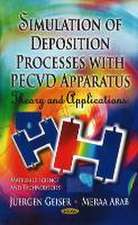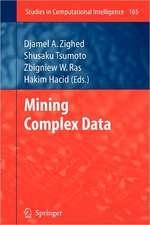Multicomponent and Multiscale Systems: Theory, Methods, and Applications in Engineering
Autor Juergen Geiseren Limba Engleză Paperback – 23 aug 2016
| Toate formatele și edițiile | Preț | Express |
|---|---|---|
| Paperback (1) | 391.40 lei 6-8 săpt. | |
| Springer International Publishing – 23 aug 2016 | 391.40 lei 6-8 săpt. | |
| Hardback (1) | 390.48 lei 17-23 zile | +36.55 lei 7-13 zile |
| Springer International Publishing – 3 sep 2015 | 390.48 lei 17-23 zile | +36.55 lei 7-13 zile |
Preț: 391.40 lei
Nou
Puncte Express: 587
Preț estimativ în valută:
74.89€ • 78.19$ • 61.98£
74.89€ • 78.19$ • 61.98£
Carte tipărită la comandă
Livrare economică 05-19 aprilie
Preluare comenzi: 021 569.72.76
Specificații
ISBN-13: 9783319358284
ISBN-10: 3319358286
Pagini: 325
Ilustrații: XXVI, 325 p.
Dimensiuni: 155 x 235 mm
Greutate: 0.49 kg
Ediția:Softcover reprint of the original 1st ed. 2016
Editura: Springer International Publishing
Colecția Springer
Locul publicării:Cham, Switzerland
ISBN-10: 3319358286
Pagini: 325
Ilustrații: XXVI, 325 p.
Dimensiuni: 155 x 235 mm
Greutate: 0.49 kg
Ediția:Softcover reprint of the original 1st ed. 2016
Editura: Springer International Publishing
Colecția Springer
Locul publicării:Cham, Switzerland
Cuprins
General Principles.- Theoretical Part: Functional Splitting.- Algorithmic Part.- Models and Application.- Engineering Applications.- Conclusions.- Glossary.
Notă biografică
Juergen Geiser is a Researcher and Lecturer at Ruhr University of Bochum, Department of Electrical Engineering and Information Technology, Bochum, Germany.
Textul de pe ultima copertă
This book examines the latest research results from combined
multi-component and multi-scale explorations. It provides theory, considers underlying numerical methods, and presents brilliant
computational experimentation. Engineering computations featured in this monograph further offer particular interest to many researchers, engineers, and computational scientists working in frontier modeling and applications of multicomponent and multiscale problems. Professor Geiser gives specific attention to the aspects of decomposing and splitting delicate structures and controlling decomposition and the rationale behind many important applications of multi-component and multi-scale analysis. Multicomponent and Multiscale Systems: Theory, Methods, and Applications in Engineering also considers the question of why iterative methods can be powerful and more appropriate for well-balanced multiscale and multicomponent coupled nonlinear problems. The book is ideal for engineers and scientists working in theoretical and applied areas.
multi-component and multi-scale explorations. It provides theory, considers underlying numerical methods, and presents brilliant
computational experimentation. Engineering computations featured in this monograph further offer particular interest to many researchers, engineers, and computational scientists working in frontier modeling and applications of multicomponent and multiscale problems. Professor Geiser gives specific attention to the aspects of decomposing and splitting delicate structures and controlling decomposition and the rationale behind many important applications of multi-component and multi-scale analysis. Multicomponent and Multiscale Systems: Theory, Methods, and Applications in Engineering also considers the question of why iterative methods can be powerful and more appropriate for well-balanced multiscale and multicomponent coupled nonlinear problems. The book is ideal for engineers and scientists working in theoretical and applied areas.
Caracteristici
Reinforces thorough understanding with a well-balanced complement of theory and practical applications Illustrates simulation methods employed in various engineering Strategies and their modifications to structure-preserving approaches Decomposes highly-precise multiscale and multicomponent problems to simpler and more-effectively solvable problems Maximizes reader insights into a wide range of engineering problems, including heat and mass transfer, plasma simulation and hydrodynamic problems with respect to multiscale and multicomponent approaches Includes supplementary material: sn.pub/extras





























